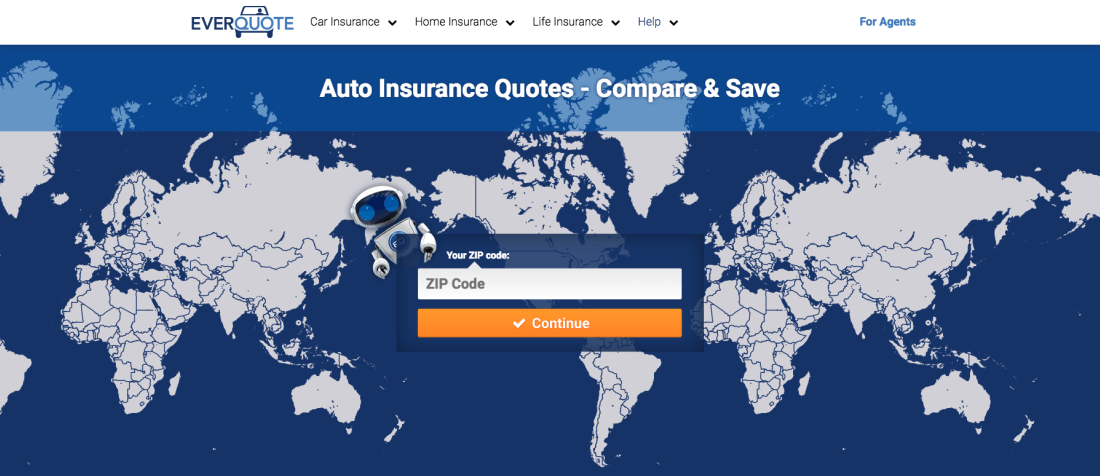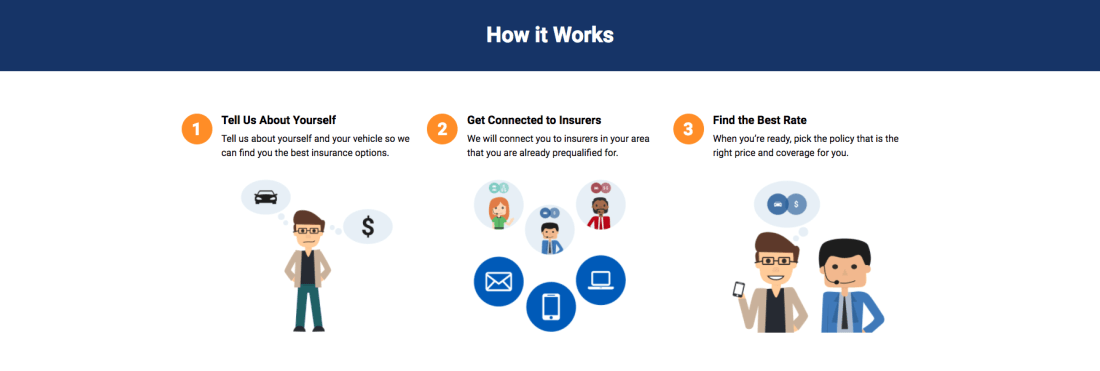
Have you ever tried shopping around to get the best quote on auto insurance? If so, you’ve probably spent hours online jumping from one carrier to the next, each promising to be the lowest price, and each failing to live up to your expectations.
EverQuote is dedicated to helping everyone find the right insurance. Their team of analysts, engineers and business development representatives are partnered with some of the best insurance providers to help consumers find the right fit for their needs.
RewardExpert recently spoke with Ryan Ruffing, Director of Communications at EverQuote, to learn more about how consumers can really save and become more educated when it comes to auto insurance.

Tips to Save on Auto Insurance
Each month, EverQuote helps millions of drivers eliminate the hassle of comparing quotes from multiple insurers by handling the legwork for you. Their rapidly scaling proprietary data and tech platform optimally matches and connects shoppers with a growing network of over 7,000 agents and 100 different carriers.
Simply fill out the online form, which takes only minutes, and you will start receiving quotes almost immediately. Best of all, the service is free to use.
We are all looking for ways to save money each month, and lowering the cost of auto insurance could be a good place to start. To get the best price available, Ruffing suggests asking about discounts when you’re comparing quotes. Some insurers have unusual discounts that could lower your rate, such as being in certain clubs or alumni groups, paying by ETF or going paperless.
Additional ways to save on auto insurance include:
- Perform an annual rate check
- Combine policies if applicable
- Report reduced mileage
- Choose a good vehicle
- Take advantage of discounts
- Select the right deductible
Let’s say you are planning a cross-country trip later this year. Is there special insurance you need before embarking on your journey? “Being on the road a lot increases your chances for an accident or claim, no matter how good a driver you are,” explained Ruffing.
When planning a long road trip, you’re going to want more than the minimum amount of liability insurance. “Consider having a high level of liability insurance of at least $100,000 for injuries per person and $300,000 for injuries per accident, which is known as the 100/300 rule,” he added.
Liability insurance is for injuries and damage you cause to others, while collision and comprehensive insurance is what pays for damages to your own car. If your car is stolen on your trip, or you run into a fence or guardrail, for example, you want collision and comprehensive coverage.
Safe Driving Report Finds Drivers Aren’t That Safe
EverQuote occasionally publishes in-depth reports and surveys to help consumers better understand the state of driving and auto insurance. Their safe-driving app, EverDrive, was designed to help people track their driving habits and learn more about what they are doing right and what they could change. In 2017, the first year of results were compiled from all users, they created the EverDrive Safe Driving Report.
The results of the survey were quite interesting. Overall, Americans scored 79/100 for safe driving. The app found that phones were used during 38 percent of recorded drives, 36 percent of drives involved speeding, 21 percent had aggressive acceleration and 32 percent had harsh braking.
If safe driving were a high school course, these drivers would be “C” students. Not too good, and not too bad.
In EverQuote’s most recent report, 2017 Family Safe Driving Report, the they looked at teen drivers and the parents of teen drivers in order to compare distracted driving behavior and the sentiment among parents and teens. Here are some key findings:
- Both parents and teens agree that texting is the biggest distraction while driving
- 74% of parents believe distracted driving is more concerning than drinking and driving, while only 21% of teens feel that way
- 63% of parents admit to texting while driving vs. 30% of teens
Ruffing explained that the EverQuote team was very surprised by some of these findings, specifically about adults texting more than teens while driving. The EverDrive Safe Driving Report found that drivers under 21 are actually 15 percent more likely to use their phone during trips than drivers over the age of 21.
“Parents need to be more aware of their driving habits, especially when it comes to phone use because they need to set a good example for their teen drivers and help prevent dangerous behaviors behind the wheel. We hope these reports and feedback within EverDrive can help driver awareness and force parents to think again before picking up their phones while driving.”

The Future of Safe Driving
As the years go by, we all have noticed the technological advancements of vehicles. So, what is in store for the future? Ruffing believes that eventually, about 10 years down the road, most cars will be almost fully autonomous, making phone use an unlikely issue.
“We now see Android and Apple implementing options for drivers to eliminate phone use through features and apps, and Apple’s latest ‘Do Not Disturb’ feature actually helped drivers decrease phone use by nearly 10 percent. We believe more options like this will help create safer drivers, but it will require legislation to truly see significant results.”
“Our EverDrive data shows states with the strictest distracted driving laws often have the best drivers when it comes to phone use. More states need to implement the policies that have clearly worked in states that have already done so,” he added.
